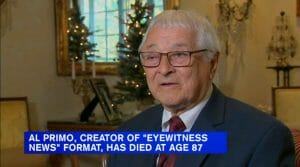At age 18, while also attending the University of Pittsburgh, Primo got a job as a mail boy at WDTV in Pittsburgh, Pa., now known as KDKA. He worked his way up at the station through multiple owners, and learned the news business inside out, putting in time as a news writer, cameraman, reporter, and news anchor. After 11 years he jumped to KYW in Philadelphia to be that station’s news director. While there, Primo came up with a big innovation in local TV news, which commonly were 15-minute shows. First, he expanded the newscasts to 30 minutes, but his biggest change was to bring field reporters into the news live, using microwave trucks to send audio and video to the station to interact with the anchors. He dubbed it “Eyewitness News” as these reporters could talk live about what they had seen, versus the typical earlier format of droning news anchors simply reading the headlines and maybe giving a few details. Or, as Primo put it, “I was determined to make the reporters the most important element of the program. They were the eyewitnesses.” Primo was snapped up by ABC’s flagship station in New York City, WABC, as its news director.

There, Primo criticized the established standard of “three white men” who “preached the news” at viewers, and brought in minority and female reporters to more reflect the diversity of the station’s viewers. They weren’t just background decoration: they were front and center on the air, live from the scenes of various news events. Primo encouraged the anchors to banter with each other and the reporters (dubbed by one TV critic as “happy talk”) and, conversely, also had them all pick up the pace. The mood was set by the fast-paced “Tar Sequence” theme from the film Cool Hand Luke, composed by Lalo Schifrin, which was used into the 1990s. Ratings soared, and not only did hundreds of other ABC (and non-ABC) stations pick up the format, but the idea even spread to stations from Canada to Australia. Primo was promoted to vice president in charge of news for ABC-owned and -operated stations. Primo was “the man who almost single-handedly changed the face of broadcast journalism,” said the New York Daily News. He left ABC in 1976 to be a consultant. Albert Thomas Primo died from cancer on September 29 at his home in Old Greenwich, Conn. He was 87.
